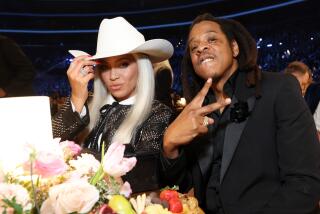Station Will Appeal FCC Indecency Fine
- Share via
A Colorado Springs radio station, fined $7,000 by federal regulators for airing a version of rap singer Eminem’s “The Real Slim Shady,” said it plans to appeal the government sanction.
Brenda Goodrich, general manager of KKMG-FM, a top-40 radio station cited by the Federal Communications Commission, said there was no intent to pander to or shock listeners. “We have a policy prohibiting the playing of indecent material,” she said. “Hundreds of stations worldwide play this same clean version that we played.”
The indecency fine levied by the FCC’s enforcement bureau last week represents an about-face for an agency that, until recently, has dismissed most of the hundreds of listener complaints it gets each year about allegedly indecent material being aired on the public airwaves.
In March, for instance, the FCC rejected a request from a Wilmington, N.C., man who wanted radio station WXQR-FM punished after it aired a promotion that referred to the male genitalia.
But new FCC Chairman Michael K. Powell has vowed to enforce all commission rules on the books. And some FCC sources speculated Wednesday that the fine against KKMG-FM may reflect Powell’s new get-tough stance.
At least one commissioner, Gloria Tristani, a Democrat, has been pushing for stronger enforcement of the FCC’s indecency rules. Tristani could not be reached for comment Wednesday. But in March she complained that “the [FCC] appears so averse to indecency cases, and has erected so many barriers to complaints from members of the public, that indecency enforcement has become virtually nonexistent.”
Earlier this year, however, a Madison, Wis., radio station paid a $7,000 fine after it played an unedited version of the Eminem rap song.
Though the FCC cited no lyrics in the song played by KKMG-FM that directly referred to the impermissible sexual or excretory functions defined under the agency’s indecency rules, the FCC found that the edited version of Eminem’s rap song indirectly made “unmistakable offensive sexual references.”
In the landmark Pacifica case in 1978, a federal appeals court upheld the FCC’s authority to regulate indecent speech on the airwaves. Those powers were broadened in 1998 when the agency implemented rules that banned indecent speech during the 6 a.m.-10 p.m. time period when children are likely to be listening.
A Colorado listener first filed the indecency complaint against KKMG in July 2000.
More to Read
The biggest entertainment stories
Get our big stories about Hollywood, film, television, music, arts, culture and more right in your inbox as soon as they publish.
You may occasionally receive promotional content from the Los Angeles Times.










